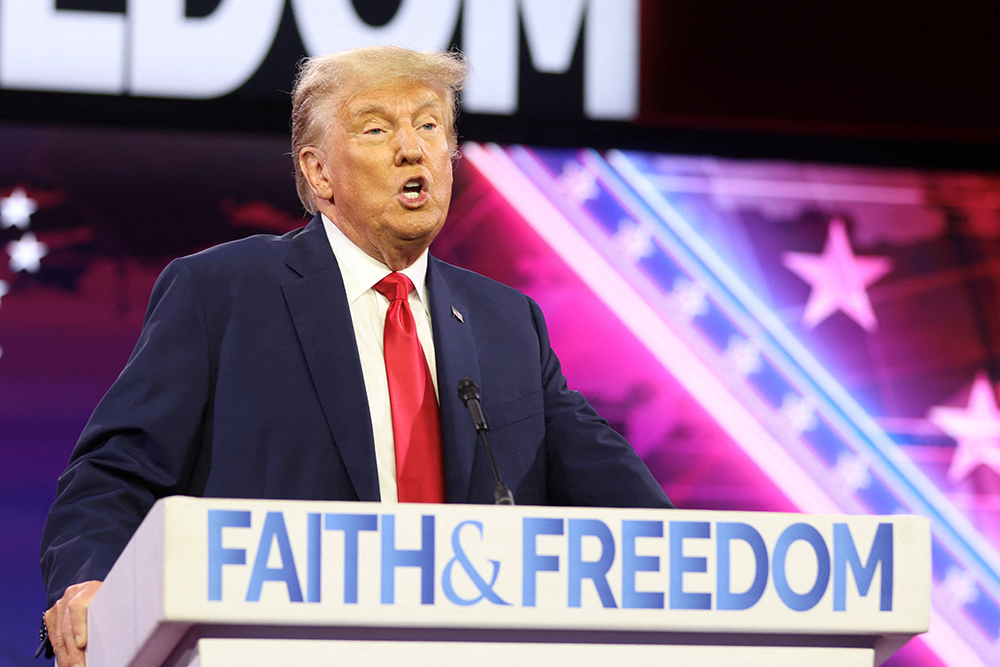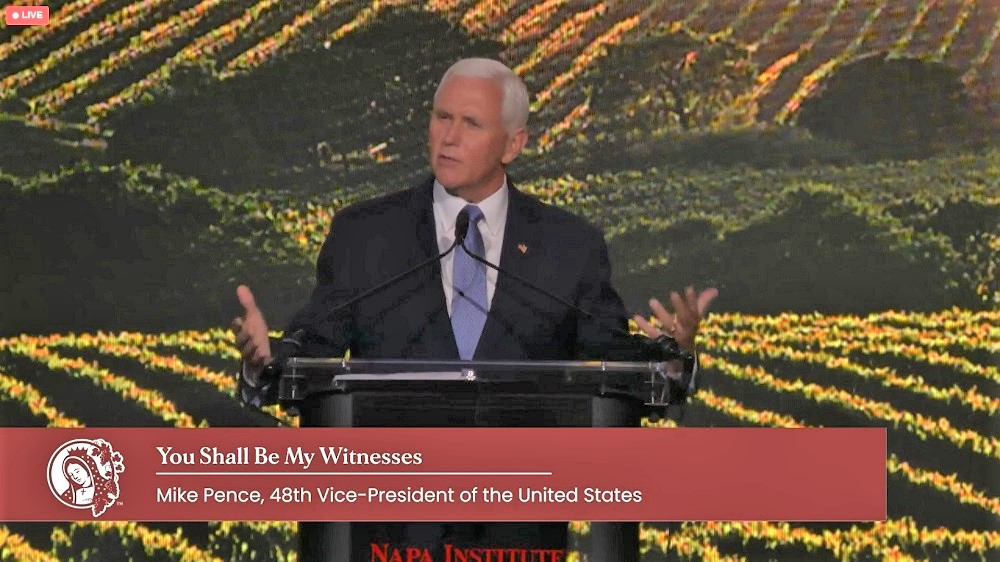
Former U.S. President Donald Trump, a Republican presidential candidate, speaks June 24 at the Faith and Freedom Coalition's "Road to Majority" conference in Washington. (OSV News/Reuters/Elizabeth Frantz)
Of all the gin joints, I mean, of all the golf courses in all the world, Cardinal Raymond Burke just happened to choose the Trump National Golf Club in Bedminster, New Jersey, for dinner?
Twitter exploded last week when media personality Doug Billings, host of "The Right Side with Doug Billings," shared a picture of himself mugging for the camera with the former patron of the Order of Malta who is now a churchman without portfolio. Burke is free to roam the world and cause mischief wherever he wishes, but Bedminster? Do you think he was there to offer spiritual comfort to the soon-to-be thrice-indicted club owner?
It was interesting to note which Twitter users Billings tagged in his tweet: Disgraced former nuncio Archbishop Carlo Maria Viganò; extremist media outlet Church Militant; San Francisco Archbishop Salvatore Cordileone; Tyler, Texas Bishop Joseph Strickland; Crisis magazine editor Eric Sammons, and Franciscan University of Steubenville professor Scott Hahn, among others.
One name especially jumped out at me: Taylor Marshall, the conspiracy theorist and podcaster who has also announced his candidacy for the presidency. Could Burke or Billings be negotiating on Marshall's behalf to become Trump's running mate? I don't see how that would work. Marshall has said he is running on the "Christ the King platform" and Donald Trump thinks he should be king. But, hey, conservative Christians have swallowed so much and so often since Trump rode down the escalator in 2015, who knows how willing they are to prostitute the faith on behalf of the Donald.
The "Christ the King" platform consciously echoes the chant of the Cristeros, Mexican Catholics who resisted the aggressive secularization and anti-Catholic policies of the Mexican Revolution in the 1920s. The persecution of Catholics at that time was real and the rebellion was violent: Some 90,000 were killed. Historian Enrique Krauze's magnificent Mexico: Biography of Power: A History of Modern Mexico, 1810-1996 is available in an English translation and is the best history of the period.
In his recent speech to the Faith and Freedom Coalition, Trump suggested that the federal government under President Joe Biden is persecuting Catholics. This claim is based on a now rescinded, admittedly troubling, FBI memo that cited a Southern Poverty Law Center list of "hate groups" that included "radical traditionalist Catholics." The memo should not have been written, as former FBI field office head Kathleen McChesney told America magazine. She called it a "terrible analytical document." But it doesn't rise to the level of persecution.
Of course, if you think any election you lose must have been stolen, as Mr. Trump believes, such distinctions are meaningless. He is as willing to enlist religion as he is to dismiss it, provided the enlistment or dismissal serve his purposes — and he can strike a pose while doing so. Trump's appeal is a populist appeal, and it is more important to display braggadocio than precision when posing for the cameras.
Advertisement
On the other coast, former Vice President Mike Pence decided to reach out to the Catholic plutocrats, attending the Napa Institute conference. He was warmly welcomed and commended for being a hero of the pro-life cause, which is at least a half-truth: Pence defends the unborn but supports capital punishment and dismisses the climate crisis, to name only two other explicitly pro-life issues.
It is in his conflation of religion and politics that Pence most resembles his former boss, and both of them represent a profoundly troubling understanding of the role of religion in society. Like most Americans, they reduce religion to ethics. It is remarkable that Pence was raised a Catholic and is now a self-described evangelical Christian. In the pre-conciliar era for which so many traditionalist Catholics yearn, he would be called "an apostate" but, so long as you oppose abortion, you get a pass on such things as the creed and the sacraments. Still, that conflation is common and is a challenge for the church, not for the state.
But the conflation does not stop at ethics. The faith is then reduced from ethics to partisan politics, and that reduction always ends up in the kind of complicity that harms religion.
"When I look at the influential men and women in this room I have to tell you, don't underestimate the importance of your voice on behalf of your faith and your values," Pence told the group, which paid $2,800 to attend the conference.

Former Vice President Mike Pence addresses the Napa Institute conference July 27 in Napa, California. (NCR screenshot)
That is what complicity looks like: affirming your audience in their sweet spot, their influence. I could not help recalling Hans Urs von Balthasar's list of the church's "most essential forces" — "prayer, suffering, faithful obedience, readiness (perhaps unexploited), humility" — and noting that influence did not make the list.
The late David Schindler's critique of liberalism, both neo- and paleo-, is lost on the Napa crowd but for any reader who is interested, here is a link to my review of Schindler's masterpiece Heart of the World, Center of the Church: Ecclesiology, Liberalism and Liberation.
Benjamin Disraeli famously quipped that "the Church of England is the Tory Party at prayer." That may or may not be the case in Britain in the 21st century as it was in Disraeli's time, but in America, there are groups of Catholics similarly who look to the political podium for their ecclesiology. Sometimes, they are found on the left, too, but more commonly they are found on the right.
The psalmist instructs us all: "I will lift up mine eyes unto the hills, from whence cometh my help" (Psalms 121:1). Those who look to politics and politicians for spiritual help may or may not decide an election, but they will be scattered in their conceit. And the politicians who play the religion card may succeed politically even while, spiritually, they are cast down from their thrones. This is how religion dies.





